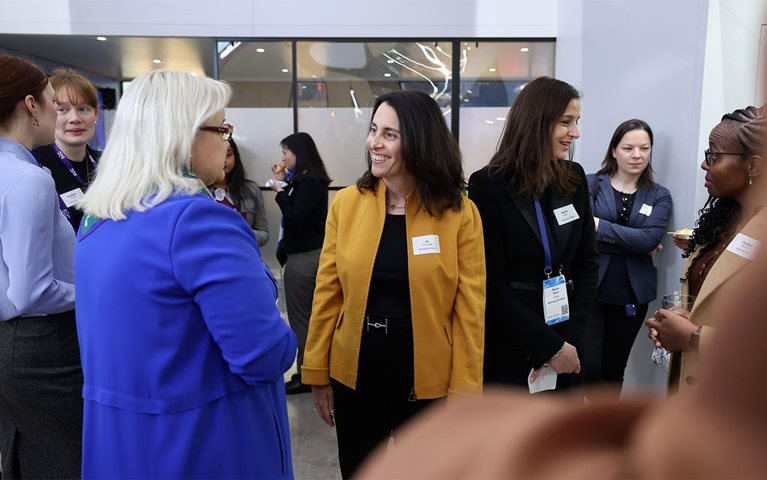Mobile World Congress (MWC) Barcelona, the world’s leading connectivity industry event, welcomed its largest audience in years with over 101,000 attendees. It marked the first time many Asian organizations were able to join in full since the pandemic, making it a truly global event.
Tech and telecommunications leaders, IT companies, and policy makers gathered to discuss the future of the industry and showcase the latest innovations: an urban air taxi; phones that are bendable—not just foldable; and jewelry that doubles as a health and fitness tracker.

“There was a real motivation to learn from each other and go after new and innovative approaches and models that leaders in the industry are doing,” Venkat Atluri, senior partner, observed.
Between the panels, roundtables, and workshops, our colleagues took a moment to share their reflections on the event.
Tangible value with generative AI
Generative AI (gen AI) has continued to cause excitement, but the focus this year has slightly shifted.
As Tomás Lajous, senior partner at McKinsey, noted, “Everybody is very enthusiastic about ChatGPT and generative AI. But it has also made them think more broadly, not just about gen AI, but about analytical AI and things that they should have been doing a while back.”

For example, AI will allow telcos to gain new visibility into their assets, such as their networks. They can better track outages, usage rates, and quality to improve their customers’ experience and ultimately retention.
Whereas last year was focused on potential, this year was more about the concrete value AI could add.
“But you need to get a lot of things right,” Tomás pointed out. “There’s a real risk that if all you do is invest in a model, you spend a lot of money, but you don’t see the value because you don’t have the right data, the right systems, or people aren’t using it the right way.”
Gen AI is also leveling the playing field. For years, analytical AI projects, which were often very complex, could only be done by larger organizations; with the widespread availability of gen AI, smaller businesses can take on these implementations as well. And since they are more agile, they’re able to make changes faster, so we may see smaller organizations taking the lead.
For 2024, Tomás predicts: “We’re going to see more scaled AI use cases, and a renewed interest in decommissioning legacy technologies so organizations can move ahead.”
Inclusivity in telecommunications
Inclusivity in telecommunications and protecting vulnerable individuals were also key topics.
Jacky Wright, senior partner and chief technology and platform officer at McKinsey, took part in the panel. She said: “The broad takeaway was the notion of an ecosystem to solve this problem.”

Gen AI has the potential to exponentially widen the digital divide, disproportionately affecting vulnerable communities. Mitigating this risk requires society to build a strong ecosystem where we each play an active role.
This means government, private and public sectors, and NGOs working together. As Jacky put it, “What are the policies that need to be instituted? And in the absence of policies, what role should companies play in ensuring safety for vulnerable communities and individuals?”
Still, it’s important to keep in mind that one solution will not fit for everyone. Jacky stated that the intersectionality—or how social identities interact—of inclusivity is required to solve the problem. “It is not as simple as saying, ‘Okay, we are going to limit access to a ten-year-old.’ Because the potential vulnerabilities of the ten-year-old in Michigan are very different from a ten-year-old in Yemen.”
She also noted that given the potential for Gen AI to spread misinformation or manipulate the types of information that people have access to or consume, there is a stronger responsibility for governments to collaborate with the private sector and other facets of society to maintain the integrity of information. “We are starting to see governments play a more active role in learning, understanding the implications, and ultimately adopting policies that will protect vulnerable communities—in particular, in the US, UK, and the EU. So, I think we will start to see shifts: we need to act.”
The future of telecommunications
“In so many ways, this industry is the backbone of the global economy. Without it, many of the services that we use today for healthcare, transportation, and education would not exist,” observes Venkat. “Which is why it’s so important that the industry capture its fair share of that value.”
To do so, Venkat said that “across regions, different players are going down different paths.” Some are looking at areas adjacent to the telecommunications industry, like media content. Others are insuring products they sell, such as mobile devices and home security. Still others are considering shifting from a telco to a techco, or technology company, and reimagining what they do.
Venkat added, “And I think there is a realization that there’s no one right or wrong answer. It really depends on what context the organization is in.”
One thing, however, is clear. As Venkat put it, “It’s quite exciting, and I can’t wait to take stock 12 months from now and see what progress we have made.”
